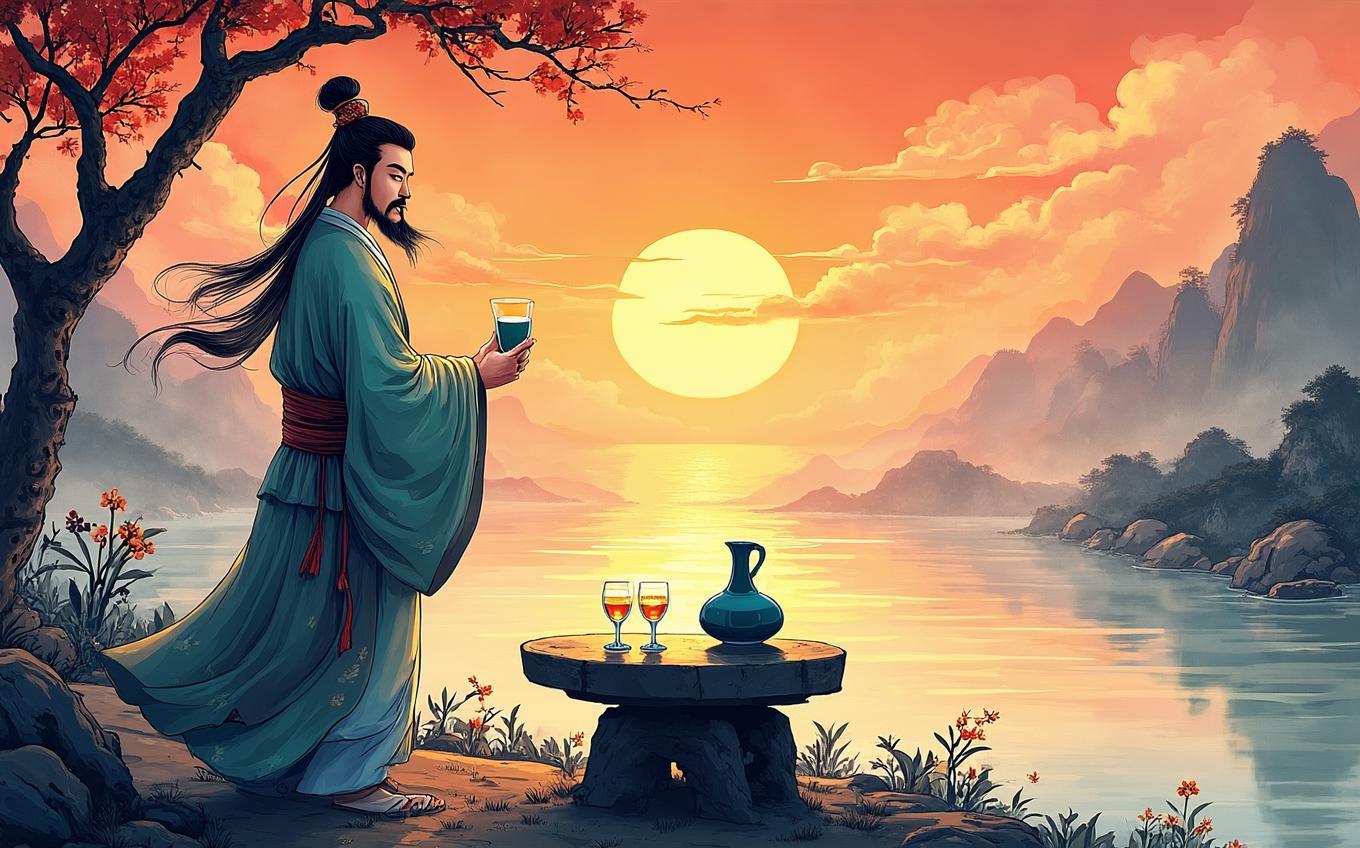Analysis of "将进酒" - Classical Chinese Poetry
Introduction
Li Bai (李白, Lǐ Bái, 701–762), also known as Li Po, is one of China’s most celebrated poets from the Tang Dynasty. His works are renowned for their romanticism, vivid imagery, and unrestrained spirit. "将进酒" (Qiāng Jìn Jiǔ, "Invitation to Wine") is one of his most famous poems, embodying his love for wine, his defiance of worldly constraints, and his philosophical musings on life’s fleeting nature. This poem remains a cornerstone of Chinese literature, admired for its boldness and lyrical beauty.
The Poem: Full Text and Translation
君不见黄河之水天上来,
Jūn bù jiàn Huáng Hé zhī shuǐ tiān shàng lái,
Do you not see the Yellow River’s waters descending from the heavens,奔流到海不复回。
Bēn liú dào hǎi bù fù huí.
Rushing to the sea, never to return?君不见高堂明镜悲白发,
Jūn bù jiàn gāo táng míng jìng bēi bái fà,
Do you not see, in bright mirrors of lofty halls, the grief of white hair?朝如青丝暮成雪。
Zhāo rú qīng sī mù chéng xuě.
At dawn like black silk, by dusk like snow?人生得意须尽欢,
Rén shēng dé yì xū jìn huān,
When life brings triumph, drink your fill of joy,莫使金樽空对月。
Mò shǐ jīn zūn kōng duì yuè.
Never let golden cups sit empty under the moon.天生我材必有用,
Tiān shēng wǒ cái bì yǒu yòng,
Heaven gave me talents, surely they’ll be used,千金散尽还复来。
Qiān jīn sàn jìn huán fù lái.
A thousand gold coins spent, more will return.烹羊宰牛且为乐,
Pēng yáng zǎi niú qiě wéi lè,
Cook the lamb, slaughter the ox, let us be merry,会须一饮三百杯。
Huì xū yī yǐn sān bǎi bēi.
And drink three hundred cups in one sitting!岑夫子,丹丘生,
Cén fū zǐ, Dān qiū shēng,
Master Cen, Scholar Danqiu,将进酒,杯莫停。
Qiāng jìn jiǔ, bēi mò tíng.
Bring in the wine, don’t stop the cups!与君歌一曲,
Yǔ jūn gē yī qǔ,
Let me sing you a song,请君为我倾耳听。
Qǐng jūn wèi wǒ qīng ěr tīng.
Lend me your ears and listen close.钟鼓馔玉不足贵,
Zhōng gǔ zhuàn yù bù zú guì,
Bells, drums, fine jade—none are precious,但愿长醉不复醒。
Dàn yuàn cháng zuì bù fù xǐng.
I only wish to stay drunk and never wake.古来圣贤皆寂寞,
Gǔ lái shèng xián jiē jì mò,
Since ancient times, sages have been lonely,惟有饮者留其名。
Wéi yǒu yǐn zhě liú qí míng.
Only the drinkers leave their names behind.陈王昔时宴平乐,
Chén wáng xī shí yàn píng lè,
Prince Chen once feasted in Ping Le Hall,斗酒十千恣欢谑。
Dǒu jiǔ shí qiān zì huān xuè.
Ten thousand coins for wine, reveling without restraint.主人何为言少钱,
Zhǔ rén hé wèi yán shǎo qián,
Host, why speak of lacking money?径须沽取对君酌。
Jìng xū gū qǔ duì jūn zhuó.
Just go buy more wine and drink with me!五花马,千金裘,
Wǔ huā mǎ, qiān jīn qiú,
My dappled horse, my furs worth a fortune,呼儿将出换美酒,
Hū ér jiāng chū huàn měi jiǔ,
Call the boy to trade them for fine wine,与尔同销万古愁。
Yǔ ěr tóng xiāo wàn gǔ chóu.
And together we’ll melt eternity’s sorrow.
Line-by-Line Analysis
-
The Fleeting Nature of Time
- The opening lines compare the Yellow River’s unceasing flow to the passage of time, emphasizing life’s transience. The contrast between black hair turning white in a day underscores how quickly youth fades. -
Carpe Diem (Seize the Day)
- Li Bai urges indulgence in joy while one can ("人生得意须尽欢"). The imagery of golden cups under the moon suggests that life’s pleasures should not be wasted. -
Defiance and Confidence
- "天生我材必有用" reflects Li Bai’s unshakable belief in his own worth, despite setbacks. His dismissal of wealth ("千金散尽还复来") shows his carefree spirit. -
The Joy of Wine and Companionship
- The poem shifts to a lively banquet scene, where Li Bai invites friends to drink endlessly. The hyperbolic "三百杯" (300 cups) conveys boundless enthusiasm. -
Rejecting Materialism
- Li Bai scorns luxury ("钟鼓馔玉不足贵"), valuing drunken oblivion over worldly honors. He humorously claims that drinkers, not sages, are remembered. -
Historical Allusion
- The reference to Prince Chen (a legendary drinker) reinforces the theme of revelry as a noble pursuit. -
Ultimate Sacrifice for Joy
- The closing lines show Li Bai willing to trade his prized possessions for wine, symbolizing his desire to escape life’s sorrows through camaraderie and intoxication.
Themes and Symbolism
- Transience of Life: The river and white hair symbolize time’s relentless march.
- Hedonism vs. Virtue: Li Bai rejects Confucian austerity, advocating joy as life’s purpose.
- Wine as Liberation: Alcohol represents freedom from societal expectations and existential dread.
Cultural Context
Written during the Tang Dynasty’s golden age, "将进酒" reflects the era’s cultural vibrancy and Li Bai’s Daoist leanings. The poem challenges Confucian ideals of moderation, celebrating spontaneity and individualism. Its enduring popularity lies in its universal message: life is short, so cherish joy and friendship.
Conclusion
"将进酒" is a masterpiece of emotional depth and lyrical brilliance. Li Bai’s exuberant call to drink masks a poignant meditation on mortality, making the poem both exhilarating and deeply human. Its themes resonate across cultures, reminding us to embrace life’s fleeting moments with passion and abandon.




Comments (0)
No comments yet. Be the first to comment!